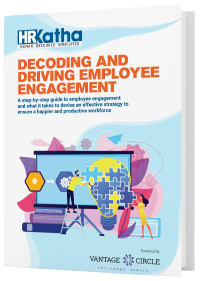5 Amazing Ways To Make Your Employees Feel Valued At Work

An essential part of a job considered “fulfilling” is greatly influenced by the person feeling valued at work. Cut that aspect off, and we are looking at a person who would rarely go above and beyond or even be satisfied enough to feel loyalty towards their place of work. To put it mildly, you’ll now have a disengaged employee at hand.
So, why exactly is it important for employees to feel valued?
Employees who feel valued are collectively the most significant thing that can happen to your company. Yes, we are serious about this.
People who feel like they are valued by the company they work for will display some unique characteristics such as these:
- Higher job satisfaction
- More happier and engaged
- Greater productivity and performance
A survey from the American Psychological Association found that feeling valued at work was linked to better physical and mental health and higher employee engagement, satisfaction, and motivation. These things will help you establish a culture where people are retained, attracted, and develop meaningful relationships.
Now that we have established the importance of making people feel values at work, let’s look at some key ways to do the same.
5 Great Ways To Make Your People Feel Valued At Work
1. Reward And Recognize In A Meaningful Way
The reason why companies fail at engaging their employees is that they could rarely do recognition right. Even though you might be having some sort of reward program at hand, it’s essential to figure out if it is the right one for your workforce.
Ask yourself some crucial questions such as:
Is the appreciation timely, instant, and on-the-spot? Do the managers and bosses proactively say “thanks” and “good job”? Is the recognition public?
Choose The Right Rewards And Recognition Platform
Pay attention to your people instead of the recognition process itself. A good reward and recognition program will make it easier, faster, and convenient for recognition to happen.
An over-complicated software or platform can make it impossible for managers and workers to be onboard. It’s also fair to assume that only a small number of individuals can actively use the site to appreciate their peers.
Give Relevant Rewards
Not all rewards are created equal. When you have a diverse workforce, offering an incentive that everyone will find beneficial becomes unfeasible for HRs. Thus, give your high performers the kind of rewards that they actually want to receive.
Some great ways to offer such flexibility is through:
-
Gift cards: Gift cards are our favorite employee rewards by far. Wide variety of options, easy to distribute and manage, flexibility to choose experiences over items. What’s not to like? These benefits genuinely make gift cards the ideal rewards for corporate employees.
-
Reward points: Reward points act as a sort of digital currency. It gives your high performers incredible flexibility to redeem the points to purchase the reward of their choice.
Reward Exemplary Behaviors
A recognition culture is not only about appreciating high performers or completing a milestone. Instead, it is about encouraging certain behaviors that turn a regular employee into an exceptional one.
For instance, does an employee is ever ready to help their team members? Or is the first one to volunteer for something? Maybe they are always prepared to work some extra hours?
These characteristics are as critical as displaying high performances. Remember to pay attention to people who exhibit such behaviors and publicly appreciate them for it.
2. Employee Feedback Matters
A crucial part of making people feel respected at work is that their views are considered significant to listen to.
Bad leaders consider that employees are only for following orders and their feedbacks is not to be regarded. Conversely, good leaders know the importance of proactively listening to the people who work for them.
Wanting to be acknowledged for their views, ideas, and perspectives is an integral part of employee satisfaction.
A culture of feedback in any work environment is vital for morale, productivity, and job satisfaction. People will be more involved and proactive in their jobs when they know that their opinions count. Ultimately employees will be more empowered and confident about the values they bring to the culture.
Managers need to offer the right feedback at the right time to the team members. To make people feel valued at work, managers should extend constructive feedback about their respective performances. In fact,
92% of respondents agreed with the assertion, “Negative (redirecting) feedback, if delivered appropriately, is effective at improving performance.”
What this stat means is that don’t sugar-coat your feedback. Even if you’re giving any essential yet negative feedback, you should have the means of making it sound more constructive.
Thus, while delivering negative feedback, remember to include helpful tips through which the recipient can improve the issue they’re having.
Similarly, positive feedback should be a constant in any work environment. Once you see a team member doing great work, pay attention to it and review their fantastic performance in a one-on-one or team meeting. Ask them if they are interested in taking on any additional roles or projects.
Also, ask about any other assistance from your side that will help them further improve their efficiency.
3. Offer Excellent Benefits
The benefits that a company provides are crucial for the overall employee experience. Employee benefits form an emotional connection for the employee towards the company.
Employees are more willing to join (and stay) in a company that considers offering impressive benefits an essential part of making people feel valued at work.
A Willis Towers Watson study found that:
78% of employees reported they’re more likely to stay with an employer because of their benefits program.
The corporate benefits that are highly designed by today’s workforce deal with the aftermath of the 2020 pandemic. Pre-pandemic, people have oriented towards perks that were more “fun” in nature.
Post-pandemic people want perks that will make work more comfortable while navigating a world ravaged by the effects of 2020. Here are the top employee perks that today’s workforce are looking for:
- Paid time off
- Flexible working options
- Paid family leave
- Health and fitness benefits
- Financial planning
- Professional development
The right perks will be an essential part of ensuring job satisfaction. A satisfied employee will be the one whose salary is compensated by a couple of benefits that make their work and personal life more enriching. That is why companies like Google and Facebook are so popular among job seekers for offering incredible benefits.
4. Prioritize Wellbeing
In 2021, employees will equate the feeling of being valued at work with having the ability to prioritize their health.
2021 is the “year of health and wellness,” without any doubt. Companies whose primary aim is to retain their workforce in the post-pandemic period will need to prioritize their employees’ overall wellness.
When we talk about wellness, we don’t mean only the physical well-being aspect. We are talking about the holistic well-being of your employees. It includes mental, physical, and financial health as well.
Here are a few measures that you can adopt to be more inclusive of your employees’ needs:
- Hold virtual wellness events that promote the need to be active in a safe way.
- Offer subscriptions to wellness apps for meditation, workouts, etc.
- Hold virtual fitness classes for yoga, stretching, etc.
- Hold online seminars for nutritional advice that employees may have
5. Offer Amazing Growth Opportunities
Train people well enough so they can leave, treat them well enough, so they don't want to. ~Richard Branson
Research indicates that 68 percent of managers don’t care about their employees’ career progression. Do you realize how disastrous it is for your employees’ sense of worth?
An employee who is not being challenged creatively is not getting the right growth opportunities. To feel valued at work, you need to provide your employees with the right resources, support, and time to grow and upskill.
Along with professional development, employees seek to develop personally, too. Although hard skill training is abundant, it should be normalized to get the necessary training to learn some critical soft skills too. Qualities like good communication, problem-solving, and decision-making are essential in an employee’s everyday life.
Such abilities should also be deemed vital enough to learn and enhance.
Finally
Are there any other approaches that HRs can use to make people feel valued at work? Let us know in the comments below.

Vantage Circle is a simple AI-powered Rewards & Recognition Platform for upgrading your employee experience and engagement for better productivity.






